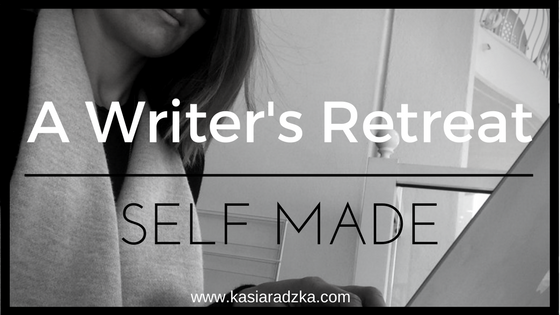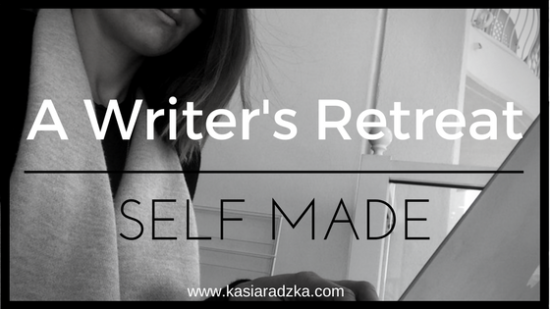I’ve been planning a writer’s retreat for over a year now. Thinking about it. Mulling the idea over in my head. Talking about it. Then I realised:
Just do it.
When you’re a mum going away for the weekend on your own to just write seems selfish. Hell, I felt guilty. For just a moment. And whilst I missed my little munchkin like crazy, I would do it again in a heartbeat…just not tomorrow.
Why Bother With A Writer’s Retreat?
Our days are filled with routines and responsibilities, distractions and excuses. It’s too easy to make and break plans for your writing unless you are super strict with your prioritising.
My key writing time is on the commute to and from the day job and after my son goes to bed. But the commute is the most reliable. Weeknights are exhausting, especially after having spent two and a half hours on the train and eight hours in the office. Often, the last thing you want to be doing is turning on the computer again.
The main benefit of a writer’s retreat is the ability to focus solely on writing. You get two days where all you have to do is write, read and edit. Meals and bathroom breaks are optional but highly recommended.
When you’ve dedicated a weekend to just writing, and as in my case paid for an apartment to really getaway, you become more motivated to get shit done and ignore any urges to procrastinate.
The only thing I procrastinated about was heading to the gym before lunch. I made it after much deliberation. As a writer, you need a break to keep the creative juices flowing and you need to move your butt. Sitting is not conducive to good health or fitting into skinny jeans.
The thirty-minute run made my afternoon equally as productive as my morning.
How Do Can You Make Your Own Writer’s Retreat Work?
* Have a plan
Putting a plan in place is integral. If you don’t have your objectives set out for your writer’s retreat then you’re going in blind and more likely to, (a) procrastinate; (b) get frustrated; (c ) be less productive.
A good plan will ensure that you get shit done in a timely fashion.
I made a list of all the things I wanted to achieve before embarking on my solo writer’s retreat.
Naturally, I overestimated how much I could actually get done and didn’t really account for the planned distractions.
There’s only so long that you can be crammed into a holiday apartment. Whilst the views were great and my writing flowed, my brain needed a break.
So I booked dinner with friends on one night. It was meant to be an early night but I didn’t end up getting back to the apartment till after 11 pm which meant the chances of waking up at 5ish the following morning to go for a run, have breakfast and start writing by 7 were not going to happen.
Yes, I planned out for each hour of the day from the moment I woke up to the moment my head hit the pillow at the end of the day, which brings me to the next point.
* Be Flexible
Flexibility is a must for a writer, especially when you’ve booked yourself away and expect your muse to show up at your beck and call.
Unfortunately, the muse has a mind of its own.
Sometimes it comes freely, sometimes you need to push and pull in the direction that you want for the creative juices to start flowing.
I have three projects on the go. Which means that if one wasn’t flowing I could jump to the next one. I had the plan in place where I worked for an hour to an hour and a half on each in the morning, then repeated the process in the afternoon.
It worked for me. I got a lot done.
* No Pressure
Pressure can be a help and a hindrance.
Whilst I had a plan and flexibility I placed no pressure on myself to get everything done. I knew that all the things I planned weren’t going to be achieved. There’s only so much you can do in two days.
Your brain will need a break. Whether that’s after an hour or eight hours will depend on you and your habits.
I can sometimes work for hours straight. Then there are days that I can’t hold my attention on one thing for more than ten minutes.
Using a timer for each task helped stay focused and relieved the pressure.
I wasn’t strict with it though. If the words were flowing I’d continue for a little bit longer.
* Treat yourself
Buy your favourite bottle of wine or organise to go out to a nice restaurant in the evening as a reward for the hard work that you’ve put in. You deserve it.
For each task you complete, give yourself a mini reward. It could be as simple as refilling your coffee cup or taking a break for lunch.
Or get creative and reward yourself with a new book from Amazon, a quick dance around the living room, or the time to watch an episode of your favourite tv series.
* Dress nicely
Avoid the tracksuit and jumper.
You want to feel good when you write.
Stepping out for breakfast before your writing day starts will help you make the effort. It’s well worth it.
I don’t know about you, but I get little done in my tracksuit unless it involves cleaning or working out.
* Have fun
Fun is important here. This is your weekend. You’re doing watch you love without interruption unless you want it.
Make it what you want it to be.
Grab a book that you’ve wanted to read. Play music. Watch a movie. Listen to a podcast.
Enjoy the process and the experience.
* Lose The Internet Connection
The internet is a time waster. It’s so easy to search for a word or piece of research only to find that an hour has passed because you couldn’t help yourself but check all your social media accounts and get lost in conversation about the differences between the comma and full stop. Ok, I’m sure you’re talking about more riveting stuff than that.
But the internet will kill your productivity.
I was glad there was no free wifi where I was staying. The only internet connection was on my phone. I used it for about half an hour during my stay.
It was awesome.
What Can You Do During Your Writer’s Retreat?
A writer’s retreat is filled with endless possibilities. You can focus on just the writing, or just editing or a combination of the two. I’m certain you’ll include reading in there too, you are a writer after all.
* Play catch up
Is there a project that you’re running behind on? Focus on catching up to where you want to be. Set the timer for an hour and get as much done as possible.
It’s amazing how much you can get done in sixty minutes.
* Get out of your comfort zone
Bring some writing exercises and take a few minutes here and there to challenge your writing muscles.
Focus on your weaknesses and you never know, they might just become your strengths by the end of the weekend.
* Set a word limit
Have you ever wondered how some writers manage an output of 5,000 or even 10,000 words in a day?
Yeah, I wish I could do that too.
Your writer’s retreat is the perfect time to challenge those writing muscles and aim high.
How many words can you write in an hour? If the words are flowing then I can write anywhere between 1500-2000 words. If they’re not, then it’s more like 500-1000.
So in an eight hour day, I could write between 4,000 and 16,000 words.
Hahaha, yes, I’m laughing too.
With that range, 10,000 would be an achievable goal to write in one day, or over course of the weekend.
What Worked, What Didn’t, & What I’d Do Different
I loved my solo writer’s retreat and I’m so glad I did it. It was productive, relaxing and fun.
Whilst I didn’t get everything done – there aren’t enough hours in the day! I got the most important things done, including:
* Finished the proofs on my new book, Lethal Games.
* Rewrote about 10,000 words in a standalone thriller I’m working on
* Wrote a long world building chapter for my urban fantasy novel
* Drafted and edited two blog posts
* Started reading How To Market A Book (Third Edition) by Joanna Penn
* Watched zero television
* Caught up with friends I hadn’t seen in ages
* Relaxed more than I thought I would
Having a plan whilst being flexible with the weekend worked well. I knew what I wanted to achieve and I got it done.
Breaking down the day into chunks was effective too. I didn’t have a chance to burn out with one story because I was changing project focus every 60 to 90 minutes.
The only other thing I’d have done different is not to plan any social catch ups in the evenings. It was nice and it did break up the monotony of working but it also ate into the time that I had to focus on writing.
I’m definitely going to do this again.
A solo writers’ retreat is a great way to jump start your writing or reignite the writing flame.
I only wish I’d done it sooner.




0 Comments